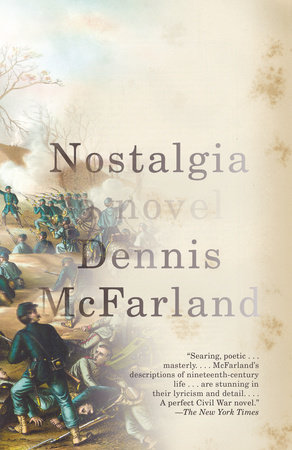Reading Group Center
- Home •
- Books by Category •
- Imprints •
- News •
- Videos •
- Media Center •
- Reading Group Center
Nostalgia: Inside the Trauma of the Civil War
Post-traumatic stress disorder may be a modern term, but soldiers from all eras in history have certainly grappled with the heavy psychological costs of battle. Bestselling author Dennis McFarland has made that the focus of his stunning Civil War novel, Nostalgia, in which a nineteen-year-old private struggles to regain his identity in a turbulent American landscape. In this feature, McFarland shares the inspiration for some of the novel’s most remarkable aspects: its title, the portrayal of PTSD, and the inclusion of American poet Walt Whitman as a prominent character.
On the story behind the novel’s title:
When I learned that nostalgia was one of the names used in the nineteenth century for the condition we today call post-traumatic stress disorder, I thought it an irresistible title for the book: not only did it have the double meaning (a mental disorder and a past time recalled), but in this context it was also ironic—contemporary usage often connotes a past time fondly recalled. Also, the word’s etymology (ancient Greek for “return home” and “pain”) made a great epigraph for the book.
On writing about PTSD and setting the story during the Civil War:
In the news and among people I met, I kept hearing about the soldiers who were coming back from our wars (in Iraq and Afghanistan) injured in this particular way. I decided to learn more about it and read Ilona Meagher’s book, Moving a Nation to Care. It’s a great overview of the problem and includes a chapter on the history of PTSD. Big surprise, it turns out that soldiers have been mentally and emotionally damaged by combat since the beginning of time. Two facts particularly struck me: whatever we learned about this condition and how to treat soldiers suffering from it seldom got carried forward to the next war—it was as if we forgot about this dire consequence of combat, and with each new war, we had to reinvent the wheel. And I read that during the American Civil War, these “crazy” soldiers would sometimes be cut loose on the battlefield and left to find their own way home, which I found heartbreaking.
On including Walt Whitman as a pivotal character:
I read somewhere that anybody with a halfway decent high school education knows that Walt Whitman was a wound dresser in the Washington military hospitals during the Civil War. I’m embarrassed to admit that I was among those who didn’t know that. My wife, Michelle Blake, who is also a writer and smarter and better educated than I, told me about Whitman when I was first doing the research for this book. Whenever I’m trying to conceive a new novel, there is usually a moment at which I feel I’ve gathered enough pieces of the puzzle to begin writing. Whitman was the added richness that pushed me over the line, and he did not disappoint. I think his presence in the story provides a kind of antithesis to the horror of war—and if there was anybody who would understand invisible wounds, Whitman would.
Excerpted from a Q&A with the author.


